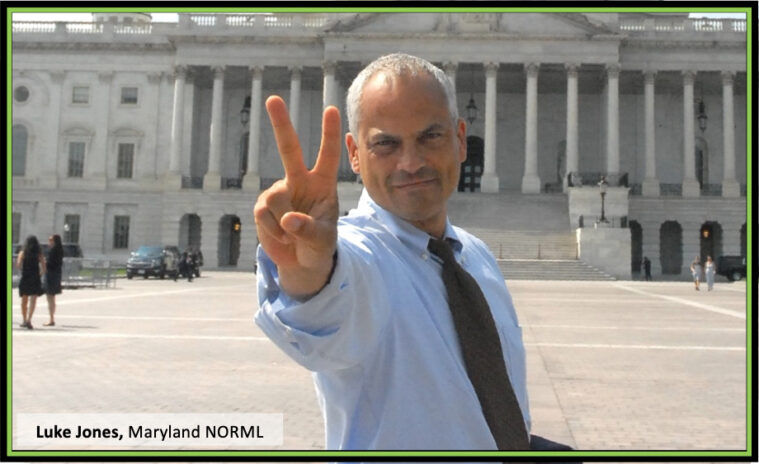“I didn’t set out to work for the legalization of Cannabis. I don’t even get paid for the work I do on behalf of Cannabis reform. I do it because I want to educate myself about Maryland politics and how citizens can effectively participate in Maryland’s political process. I have an expansive view on freedom and a real desire to impact public policy.” Luke Jones was politely answering questions over the whoops and laughter of his two sons as it neared their bedtime. As the Director of the Maryland chapter of the National Organization for the Reform of Marijuana Laws (NORML), Jones wears many hats each day – dutiful employee, concerned Maryland citizen, Cannabis advocate, devoted father. But as the fiftieth year of prohibition passed, the job of ending the criminal punishment of Cannabis users and creating a marketplace of safe and healthy products can wait no longer.
“If legalization of marijuana in Maryland is so popular, and we all agree by a wide margin that reform should happen now, why hasn’t it happened already?” This was the question Jones began to ask himself in the summer of 2020. What more could he do? How could he personally speed along the political process and make conditions ripe for consensus? Jones reasoned that if a legalization bill was going to pass this year, the same bill had to be cross-filed in the Maryland House of Delegates and the Maryland Senate early on. And it needed co-sponsors who would vigorously defend the legislation against frivolous attempts to derail it through delay and distraction.
Over the summer of 2020, Jones worked with the Marijuana Policy Project (MPP) to identify legalization bill sponsors, arranging a meeting between Senator Feldman (D-15) and Delegate Lewis (D-24) in the first week of November 2020 before the session. “We brought them together last fall to meet each other, iron out differences, and be prepared to cross-file the bills in both houses of the legislature,” said Jones. With Lewis, Jones knew he had a talented politician who could listen to opposing interests, discuss them rationally, then defend the merits of his position. In Feldman, Jones thought he had a comrade-in-arms. Maryland Senate President Bill Ferguson (D-46) assigned the legalization bill to Feldman, who was happy to be the lead sponsor. But when the session started, it was clear that something had changed.
“During the fall of 2020, Senator Feldman assured us he was ready to help make legalization a 2021 priority,” said Jones. “By the time the 2021 session began, however, it became clear that there were a lot of caveats and expectation-lowering by Senator Feldman … Some influential medical Cannabis license holders did not want the adult-use legalization bill to pass in 2021, and they put resources into that effort. We should not craft our policy reform timeline based on what paid lobbyists and current license holders want.”

Jones believes that the failure to pass Cannabis legalization this year was caused by the corrupting influence of money in politics. Maryland should have been ripe for legalization legislation this past session–even before Virginia and New York passed their legalization laws. As evidence, he points to the following undisputed facts:
Point 1: Maryland’s Medical Cannabis Program brought in nearly $50 million in dispensary sales in March 2021, and total sales have already exceeded $ 1 billion.
Point 2: According to Maryland’s 2019 Uniform Crime Report, the State had more than 15,000 marijuana possession arrests annually, which has barely moved since the enactment of medical Cannabis legislation in 2014.
Point 3: Two-thirds of Maryland citizens support legalization.
Point 4: Cannabis legalization is central to both police reform and increasing state tax revenue – the top two legislative priorities in the Maryland General Assembly in 2021. But rather than expanding this popular program to include more people and more participants, Maryland kept the current medical Cannabis program in place, protecting market access for a limited number of businesses – the very result current license holders wanted.
“Politicians are rightly saying, it’s a complicated issue,” said Jones. “But citizens should not have to fight paid lobbyists to secure our personal freedoms. Forming a coalition, making compromises – these are essential aspects of any legislative campaign. However, no legislator should take cash from the businesses they seek to regulate. Democracy is stronger when people engage with their representatives – that’s the way it’s supposed to work. The political system gets messed up when companies jump in and start throwing money at politicians – this has been our biggest obstacle to progress here in Maryland.”










